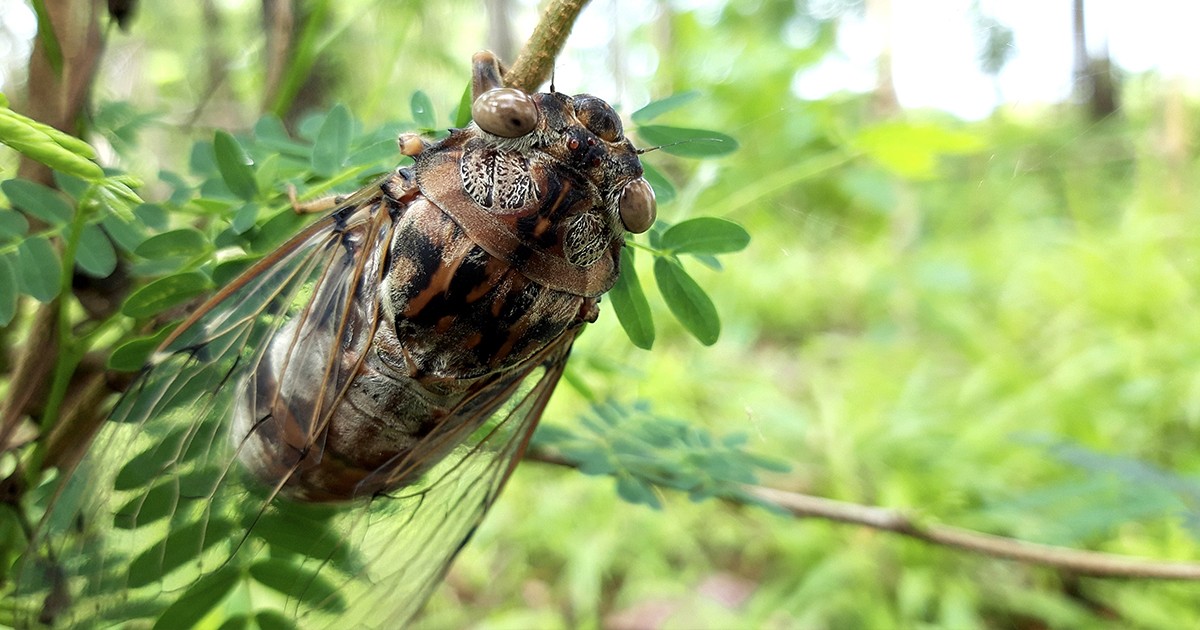
By Melinda Halpert
Seventeen years ago, as billions of cicadas began to rise up from the earth, I, too, was emerging from my own dark place. In a year that had me still reeling from loss, the onslaught of cicadas in May of 2004 seemed fitting. What’s one more plague? I thought, as I moved robotically through a gut-punch of grief that started the prior summer with my mother’s swift and unexpected death from a cancer that we had understood she would survive. In the grimmest of coincidences, her death occurred just two days after the more expected death of her older sister. The original Lucy and Ethel we called them, two funny, sparkling, often exasperating women. I adored them. Not long after that desolate week of synchronized funerals and two-for-one shiva visits, Hurricane Isabel blew through, and we were without power for days. First pestilence. Then hail. Then darkness.
By early 2004, my father started to surface from the depths of our shared grief. He sold his house — how strange to think of it as “his” and not “theirs” — and moved into a sunny garden apartment in a retirement community. The inevitable brisket brigade came calling, a steady stream of women eager to meet, feed, and console a new widower, though he chalked up his appeal to being able — still — to drive at night. He met a nice woman named Fran. He started painting watercolors again. He returned to his weekly “geezers” lunch, a gathering of retired journalists like himself, whose sharp insights into world events rivaled any Sunday morning talk show. His budding happiness made me happier, until one bleak day in late February when he mentioned that he had hit a “speed bump” with his health. He tried to downplay the severity of what he knew would snap me back to immediate and intense worry. But advanced lung cancer is not so casually dismissed. Such a cruel plot twist for us both, this diagnosis. Back on the cancer carousel again. Chemo and caregiving. So soon. Too soon.
Between his doctors’ appointments and rounds of treatment, he took Fran to dinners and concerts and art galleries. They traveled a bit and met each other’s friends and families. He railed against the reelection campaign of George W. Bush, whom my father considered the worst president ever. (Little did he know how bad a president could be.) My father’s old friends rallied around, as did his growing circle of new friends. He remained a wise confidant to our older son who was applying to colleges, and he never tired of listening to our younger son recount his ninth-grade exploits. My father read widely, and he found comfort in Seneca’s 2000-year-old meditations on mortality. Like Seneca, my father chose not to fixate on the length of his life, only on its quality and fullness.
Then came the locusts. Even though cicadas are different and more benign than the biblical scourge, the metaphor worked for me at a time that smacked of Old Testament wrath. In May of 2004, weird, winged insects with big, red eyes began blanketing Washington, DC, where I live. I stepped gingerly on sidewalks to avoid the telltale crunch of the exoskeletons they had left behind. Their seduction song was anything but subtle, with a decibel range that hovered between hair dryers and lawn mowers. Ordinarily, I’m skittish around bugs, but cicadas proved more intriguing than repulsive. They were klutzy and even endearing, as they bobbed and weaved in flight, trying not to bump into us. For no particular reason, my husband preserved a collection of cicada carcasses in a blue Tiffany box that he kept on his desk at work. It made a good conversation starter with clients.
Within six weeks, the cicadas had vanished, their life’s work complete. They had emerged, flown, eaten, sung, and mated. They had ensured the persistence of a new generation, as their nymph offspring dropped from trees, and burrowed into the soil to begin their long, subterranean gestation.
I can’t tell whether the seventeen years since the cicadas last roamed the earth have passed in an instant or at glacial, geological speed. Maybe both are true. While the cicadas dreamt their dreamless sleep, my father lived for one more year; my teenage sons somehow became men in their thirties; and my husband and I metamorphosed from working parents in our forties to new retirees in our sixties. More than a year ago, as the pandemic took hold, we burrowed into our homes. Like the cicadas, we, too, are emerging into a changed world.
Small holes began breaking through the mulch last week, evidence that those little nymphs were stretching toward the light. Today I spotted two precocious cicadas that had just shed their slimy armor. With glistening wings, wobbling legs, and those unearthly eyes, they darted off to tend to their full and fleeting lives.